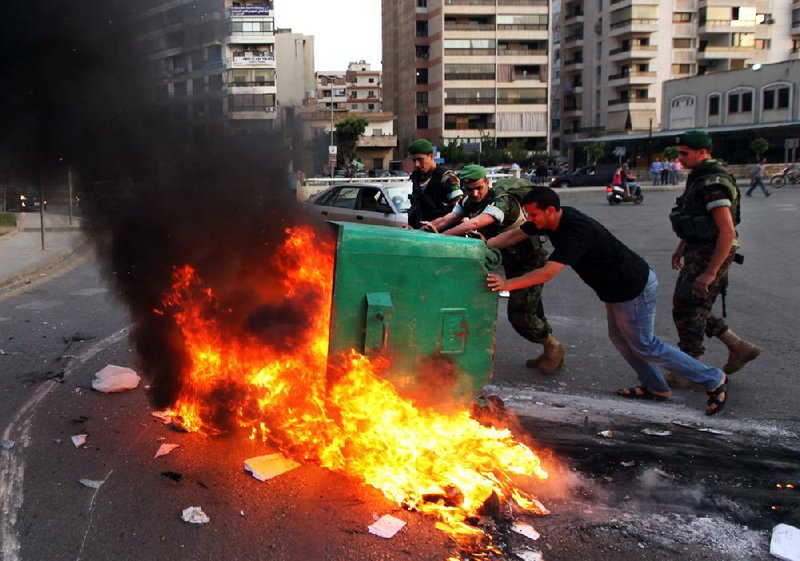BEIRUT — The leader of Lebanon’s Shiite militant group Hezbollah appealed for calm Tuesday after people blocked roads and burned tires in Beirut to protest the kidnapping of 11 Lebanese Shiites in neighboring Syria.
The abductions in Syria’s northern Aleppo province threatened to ignite dangerous sectarian tensions and fueled fears that Lebanon is getting drawn into the chaos next door.
The Lebanese were on their way home from a religious pilgrimage in Iran when Syrian rebels intercepted their vehicles, Syria’s state-run SANA news agency said. The rebels abducted the 11 men and a Syrian driver. The women were released.
Lebanese security officials confirmed the kidnappings.
As the news of the kidnappings spread, residents of the southern suburbs of Beirut, a Shiite area, took to the streets and burned tires and blocked roads in protest. The leader of Hezbollah, a strong ally of the Syrian regime, appealed for calm and warned his followers against revenge attacks targeting Syrians.
“This is strictly prohibited,” Sheik Hassan Nasrallah said in a televised speech.
He said the Lebanese government must press for the pilgrims’ release.
“We will work day and night until these beloved people are with us,” Nasrallah said.
Hezbollah has stood by Syrian President Bashar Assad as he struggles to put down a 15-month-old uprising.
Sunnis form the backbone of the Syrian revolt, which has unleashed boiling sectarian tensions. Assad and the ruling elite in Syria belong to the tiny Alawite sect, an offshoot of Shiism.
Within hours of the kidnappings, the Syrian government began moving into Azaz in Aleppo province, where the abductions took place, activists said.
Syria’s uprising began in March 2011 with mostly peaceful calls for change, but the government’s brutal crackdown on dissent led many in the opposition to take up arms. The U.N. estimates more than 9,000 people have been killed as the conflict spirals toward civil war.
Tuesday’s kidnappings come at a time of deep tension in Lebanon over Syria. The countries share a complex web of political and sectarian ties and rivalries, which can quickly turn violent. The conflict already has spilled across the border, with deadly results.
Lebanese Sunni groups supporting and opposing the Damascus regime fired rocket-propelled grenades and machine guns in Beirut early Monday, killing at least two people. It was among the most serious fighting in the capital since 2008.
The spark for the violence was the killing Sunday of Sheik Ahmed Abdul-Wahid, an anti-Syrian Sunni cleric, and his bodyguard in northern Lebanon. A Lebanese soldier shot the men, apparently after they failed to stop at an army checkpoint. The killing fueled deep anger over the perceived support of some of Lebanon’s security forces for the Syrian regime.
EGYPT
An Egyptian criminal court sentenced five policemen to 10 years in prison in a rare judgment against security forces accused of killing protesters during the 18-day mass uprising that led to former President Hosni Mubarak’s ouster last year.
Two others accused in the deaths of five protesters were given one-year suspended sentences, the court said in a faxed statement. The court also acquitted 10 of the 17 officers who had been charged in connection with the violence in the Greater Cairo district of Giza. Another 17 people were injured in the fighting.
The verdict, a day before the start of landmark presidential elections in Egypt, follows a series of recent court verdicts acquitting police officers accused of involvement in the deaths of 846 people known to have died during the protests. A ruling in the case of Mubarak, charged with complicity in the killings, is due June 2.
YEMEN
Yemeni leaders led a somber ceremony Tuesday to mark the country’s National Day, scaling back the celebrations a day after a suicide bombing killed nearly 100 soldiers during a rehearsal for a military parade.
President Abed Rabbo Mansour Hadi, along with top military commanders, government officials and foreign diplomats, took part in a small, symbolic parade held inside Sana’s Aviation Academy.
In Monday’s suicide attack, a Yemeni soldier detonated a bomb hidden in his uniform during a rehearsal for a military parade for National Day, which marks the 1990 reunification of north and south Yemen. Ninety-six soldiers were killed and at least 200 wounded in what was one of the deadliest attacks in the capital in years.
Al-Qaida’s branch in Yemen claimed responsibility for the bombing, saying in an e-mailed statement that the suicide attack was intended to avenge a U.S.-backed offensive against al-Qaida in a swath of southern Yemen seized by the militant movement last year.
TUNISIA
Tunisia said Tuesday that it will soon extradite Al-Baghdadi Al-Mahmoudi back to his homeland, after detaining the former Libyan prime minister for eight months.
Al-Mahmoudi was arrested in September for illegally crossing the frontier into Tunisia as he tried to flee to Algeria, where members of former Libyan leader Moammar Gadhafi’s family had sought refuge.
Lawyers and human-rights groups had opposed the extradition, saying Al-Mahmoudi might be harmed by Libya’s new ruling authorities — representative of the rebels who overthrew Gadhafi last year.
Mondher B edhiaf i, a spokesman for Tunisia’s justice ministry, said the extradition would occur in the coming weeks, but only once necessary procedures were completed.
Information for this article was contributed by Bassem Mroue, Elizabeth A. Kennedy, Ahmed Al-Haj and Bouazza Ben Bouazza of The Associated Press; and by Ahmed El-Sayed and Dahlia Kholaif of Bloomberg News.
Front Section, Pages 6 on 05/23/2012

